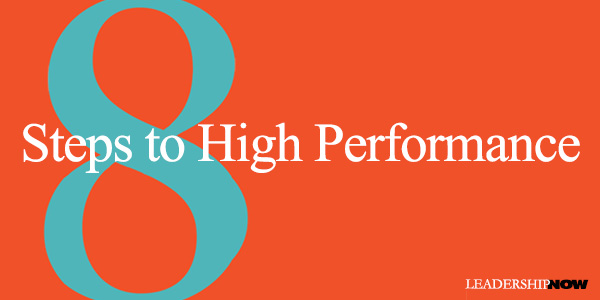 |
 |
12.28.20

8 Steps to High Performance
MARC EFFRON believes anyone can be a high performer. That is a person “who consistently delivers better results and behaviors, on an absolute and relative basis, than 75 percent of their peers.” In 8 Steps to High Performance, he identifies eight proven performance drivers that we have the ability to implement. Effron theorizes that each of us has factors that are the fixed 50 percent that affect our performance. They are things like our intelligence, core personality, and socioeconomic background. Some of these are genetic, and others are part of our environment growing up. (Which we can change if necessary as we grow older.) So it makes sense that we focus on practicing the things we can control that have the most impact on our performance. The other half, he calls the flexible 50 percent. These are things in your control, like how you set goals, behave, develop, network, present yourself, and manage your sleep. Most of these boil down to getting out of your own way. The 8 steps to high performance are: Step One: Set Big Goals. This step is, not surprisingly, critical. You can’t deliver big results if you don’t have big goals. And those goals should align with what matters most to the organization. “Bigger goals, focused on the right things, allow you to demonstrate higher performance. Bigger goals also test your capabilities and build self-confidence in your ability to deliver great results in the future. Since bigger goals are also more challenging to achieve, you’re forced to build new skills and capabilities to achieve them.” Step Two: Behave to Perform. You can control your behavior. Your behavior is what sets you apart, and it is what your boss and others you work with pay attention to. Effron shares some baseline behaviors that can help your performance—ability to connect, innovate, inspire, and model—and eleven behaviors that can derail your effectiveness like being excitable, skeptical, leisurely, bold, eccentric, a perfectionist. “High performers work hard to identify the most productive behaviors, learn new behaviors where needed, and stop showing the less helpful ones.” Step Three: Grow Yourself Faster. The more you grow, the better you can perform, and the more opportunities you will earn. Create a Personal Experience Map by asking experts in your field to identify the most meaningful experience for you to gain. “As working professionals, we grow our capabilities about 70 percent through our experiences, about 20 percent through others, and about 10 percent through formal learning.” Step Four: Connect. Build networks both inside and outside of work. “Those who connect more effectively have higher performance because they’re able to get more insights, favors, and answers from more people. And it’s almost entirely controllable by you.” Step Five: Maximize Your Fit. Continue to grow into the needs of your organization. “You’ll only stay a high performer if you adapt your capabilities and approach to what your company needs at the moment.” What does your company need for you to deliver? Step Six: Fake It. We manage impressions all the time. “As your career evolves, your continued high performance will require you to show new behaviors. How fast you adapt to these behaviors will help differentiate you as a high performer. Some of these behaviors won’t come naturally to you, and you may not be fully convinced they’re the right way to manage or to work.” Guess what? Growth is uncomfortable at first. Fake it until you get it right. Step Seven: Commit Your Body. “Your body plays a critical role in your performance; it’s important to eat right, exercise, and get enough sleep.” When it comes to sleep, quality is more important than quantity. Six and a half to seven hours is the sleep sweet spot. While studies seem to indicate that exercise matters a little and diet has no measurable effect on high performance, I think that may be short-sighted. And the two certainly play into long-term performance. It’s a package. Step Eight: Avoid Distractions. Effron dismisses many of today’s management ideas. And we do have to careful of the latest fads enlisting them as some sort of solution to all of our problems. He picks apart the strengths movement, emotional intelligence, 10,000 hours of practice, and growth mindset, among others. In the limited perspective he describes for each of them, he is right, but a thorough understanding of these concepts provides valuable insights for being a high performer. For example, emotional intelligence has very little to do with personality and is more about understanding your effect on others. Weaknesses need to be managed and often improved on, and a growth mindset is not about individual intelligence. Al of these ideas will help you increase your performance. When looking over the 8 steps, evaluate yourself on which ones you have mastered and which ones you need to work on. You might not be able to hit all of the steps but take those you need to work on, one at a time, and you will be headed in the right direction. 8 Steps to High Performance is quite valuable in showing you how to get out of your comfort zone to begin to contribute to your potential. Each chapter ends with a section called “What Can Get in the Way” that highlights some of the rationalizations and obstacles one might encounter in taking the next step in their development. 
Posted by Michael McKinney at 01:27 PM
|
BUILD YOUR KNOWLEDGE
 

How to Do Your Start-Up Right STRAIGHT TALK FOR START-UPS 
Grow Your Leadership Skills NEW AND UPCOMING LEADERSHIP BOOKS 
Leadership Minute BITE-SIZE CONCEPTS YOU CAN CHEW ON 
Classic Leadership Books BOOKS TO READ BEFORE YOU LEAD |